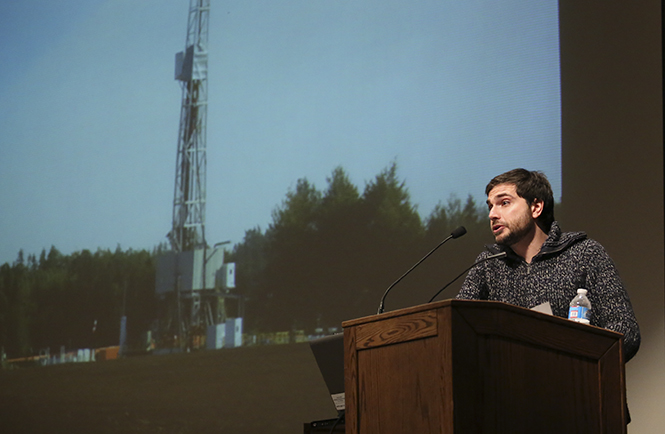Global Communication Issue forum discusses worldwide fracking
Bulgarian journalist Dimiter Kenarov speaks at the Fracking Forum in the KIVA on Feb. 20. Kenarov, who has written for Esquire and The International Herald Tribune, spoke about how the process of fracking affected people from Poland to Ohio. Photo by Brian Smith.
February 21, 2013
The School of Communication Studies hosted its first Global Communication Issue forum, “Fracking: Promise or Peril” with a panel of four in the Kiva Wednesday.
The panel included Dimiter Kenarov, journalist for the Pulitzer Center for Crisis Reporting; two Kent State geology professors, Donald Palmer and Yoram Eckstein; and Bob Downing, an Akron Beacon Journal reporter.
Hydraulic fracturing or “fracking” is a way to extract natural gas using a mixture of water, sand and chemicals from shale plates beneath the surface.
“We have to learn to understand issues of a variety perspectives, and this forum is an opportunity to do that with fracking,” said Paul Haridakis, the director of the School of Communication Studies who began the event. “We shouldn’t just think about how fracking effects us in Ohio, but around the world.”
Mitch McKenney, a Journalism and Mass Communication professor, was the moderator of the panel. Before introducing Kenarov, McKenney gave the audience background information about fracking.
Kenarov, who specializes in natural gas extraction, spoke next.
He mentioned that he got interested in fracking when he was in Bulgaria and the Chevron Energy Company began to explore shale gas.
“This was the hardest project I’ve ever done,” Kenarov said, even though he has tackled tough subjects such as the Iraq War.
During his speech, Kenarov used a slideshow of areas where shale gas is located in the United States. The next slide was of the world and the areas where shale gas is located.
After Kenarov finished, Palmer, Eckstein and Downing joined him to answer questions from the audience written on index cards.
Each panel member gave his view on the topic while answering.
“Shale gas is a fossil fuel, and it will continue to accelerate global warming” Palmer said when asked about how shale fracking can affect the environment.
Sonja Dittmann, freshman global communications major said the panel gave extra information on fracking she didn’t know before.
“The panel did a good job on making it informative,” Dittmann said.
Keith Mollohan, junior electronic media production major, said the panel broadened his view of the fracking issue.
“What I didn’t realize was that it is a big deal around the world,” Mollohan said. “Almost every continent deals with [fracking].”
Contact Alyssa Flynn at [email protected].












